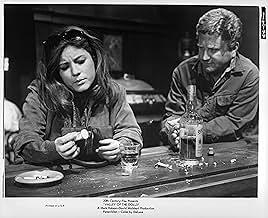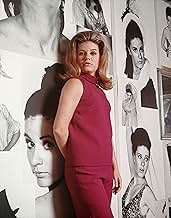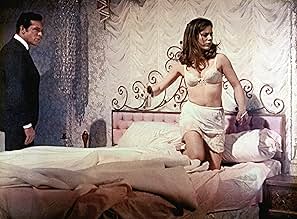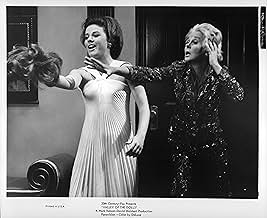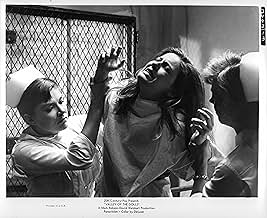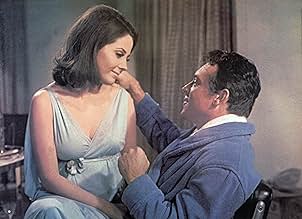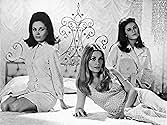IMDb रेटिंग
6.0/10
10 हज़ार
आपकी रेटिंग
अपनी भाषा में प्लॉट जोड़ेंFilm version of Jacqueline Susann's best-selling novel chronicling the rise and fall of three young women in show business.Film version of Jacqueline Susann's best-selling novel chronicling the rise and fall of three young women in show business.Film version of Jacqueline Susann's best-selling novel chronicling the rise and fall of three young women in show business.
- निर्देशक
- लेखक
- स्टार
- 1 ऑस्कर के लिए नामांकित
- 6 कुल नामांकन
Alexander Davion
- Ted Casablanca
- (as Alex Davion)
Sherry Alberoni
- Neely O'Hara
- (वॉइस)
- (बिना क्रेडिट के)
फ़ीचर्ड समीक्षाएं
This movie truly is badly done and campy. However, there is one good reason to watch it: Sharon Tate. She was truly one of the screen's all time beauties (if you disagree at first, name someone prettier =)
She is not a bad actress either and did her best with the forced, artificial dialog. Overall the movie has virtually no suspense or drama or tension it just chugs along predictably with one badly written scene after another. Then all of sudden Wham! Sharon appears and you stop caring about the worthless "plot" and watch her. She steals all her scenes and makes the other actresses invisible.
All in all its a bittersweet vehicle for an extraordinarily lovely woman who met a very violent and tragic end.
She is not a bad actress either and did her best with the forced, artificial dialog. Overall the movie has virtually no suspense or drama or tension it just chugs along predictably with one badly written scene after another. Then all of sudden Wham! Sharon appears and you stop caring about the worthless "plot" and watch her. She steals all her scenes and makes the other actresses invisible.
All in all its a bittersweet vehicle for an extraordinarily lovely woman who met a very violent and tragic end.
The film adaptation of Valley of the Dolls is stupid, empty, overly melodramatic...and a lot of fun!
Jacqueline Susann's 1966 novel is my all-time favorite, and her gritty, glossy pulp material was severely diluted for the big screen. That is the main problem. Too many punches are pulled, the characters are sweetened up, and a completely ridiculous happy ending (which Jackie hated) is substituted for the book's bleak, satisfying conclusion. Mark Robson's film has none of the spirit of its basis.
With that out of the way, the movie is very enjoyable for what it is: An unintentional laugh riot. The dialogue is hilarious and eminently quotable--"Boobies, boobies, boobies! Nothin' but boobies! Who needs 'em? I never had any! Didn't hurt me none!" Most of the supposedly "dramatic" and "touching" scenes are a scream. Patty Duke is priceless as the speech-slurring, tantrum-throwing, self-destructive Neely O'Hara. Watch her flailing around during the "It's Impossible" number; notice the embarrassing position of her beads. Barbara Parkins seems to have taken one Seconal too many before shooting, as she appears to be completely anesthetized. Susan Hayward gets to bellow a lot, fight with Duke, and get her wig thrown into a toilet in the most famous scene. The only one who comes off really well is Sharon Tate, a talent who never got the attention she deserved in life. Hers are the only genuinely affecting moments in the film, especially her final scene.
The candy-colored photography is good, beautifully capturing the glossy red capsules taken at every turn. The hair and fashions are glamorous--and so is the hairspray can! Dionne Warwick sings the beautiful theme, and the rest of the songs are enjoyably silly. I have the soundtrack LP--TWO copies! In conclusion, the ultimate camp classic! I'm off to take another doll now....
Jacqueline Susann's 1966 novel is my all-time favorite, and her gritty, glossy pulp material was severely diluted for the big screen. That is the main problem. Too many punches are pulled, the characters are sweetened up, and a completely ridiculous happy ending (which Jackie hated) is substituted for the book's bleak, satisfying conclusion. Mark Robson's film has none of the spirit of its basis.
With that out of the way, the movie is very enjoyable for what it is: An unintentional laugh riot. The dialogue is hilarious and eminently quotable--"Boobies, boobies, boobies! Nothin' but boobies! Who needs 'em? I never had any! Didn't hurt me none!" Most of the supposedly "dramatic" and "touching" scenes are a scream. Patty Duke is priceless as the speech-slurring, tantrum-throwing, self-destructive Neely O'Hara. Watch her flailing around during the "It's Impossible" number; notice the embarrassing position of her beads. Barbara Parkins seems to have taken one Seconal too many before shooting, as she appears to be completely anesthetized. Susan Hayward gets to bellow a lot, fight with Duke, and get her wig thrown into a toilet in the most famous scene. The only one who comes off really well is Sharon Tate, a talent who never got the attention she deserved in life. Hers are the only genuinely affecting moments in the film, especially her final scene.
The candy-colored photography is good, beautifully capturing the glossy red capsules taken at every turn. The hair and fashions are glamorous--and so is the hairspray can! Dionne Warwick sings the beautiful theme, and the rest of the songs are enjoyably silly. I have the soundtrack LP--TWO copies! In conclusion, the ultimate camp classic! I'm off to take another doll now....
There's nothing I can add to the many hilarious and trenchant comments of other IMDB users--"Valley" will live forever as one of the greatest bad movies ever. But here's something nobody else has picked up on. The scene when Patty/Neely discovers hubby Ted cavorting in the pool with another woman? Well, before Patty/Neely sees them, she hears splashing and giddy, girlish laugh. That splash and laugh are Marilyn Monroe--audio from her famous nude swim scene in "Something's Git To Give," the movie she never finished.
Somebody at 20th Century Fox--MM's home studio--had a perverse sense of humor!
Somebody at 20th Century Fox--MM's home studio--had a perverse sense of humor!
One of the great landmarks in the history of American cinema. This is one of those movies that tells it like it is, takes it on the chin, and really shows some SPARKLE. Oh yeah, the wigs and gowns are fab, too, especially that sequined poison-green trapeze minidress Patty Duke is too trashed to get into towards the end.
There is a kind of sublime awfulness about the performances that elevates every sentence in the screenplay to some scriptural stratum of indelible elegance. Lines like "Gee, honey, that ole witch oughta be boiled in oil," "You're not the BREADWINNAH either," and "SPARKLE, Neely, SPARKLE" ring with poetic resonance in one's mind long after viewing the film. Especially when you find yourself compulsively watching it over and over and over again...
The montage sequences are unbelievably powerful. Forget Medium Cool, you haven't experienced the true tacky splendor of the Sixties till you've seen Barbara Parkins' Gillian Girl Commercial. Get the soundtrack and use the jingle composed by master artiste Andre Previn on your answering machine. Why, all your friends will be ringing the phone off the hook just to have a listen.
As Superstar Helen Lawson, Susan Hayward is head and shoulderpads above the rest of the cast, especially when she's attempting to lipsynch her way through "I'll plant my own tree" while dodging the giant translucent fake Calder mobile (probably built by Monsanto) that's slowly revolving around her. The symbolic-castration wig-in-the-loo sequence has to be seen to be believed. "I'll go out the way I came in" admirably sums up the sentiments of everyone connected with this movie after it was released. See Patty Duke's autobiography for some anecdotes about the filming.
This movie pretty much destroyed Director Mark Robson's career, but it made pots and pots of money for the studio, and was still playing drive in theatres around the country years after its release. And curiously enough, many women I have known now in their fifties and sixties felt drawn to this film, felt that it spoke to them (if not for them) in a way nothing else up till that time had done.
There is a kind of sublime awfulness about the performances that elevates every sentence in the screenplay to some scriptural stratum of indelible elegance. Lines like "Gee, honey, that ole witch oughta be boiled in oil," "You're not the BREADWINNAH either," and "SPARKLE, Neely, SPARKLE" ring with poetic resonance in one's mind long after viewing the film. Especially when you find yourself compulsively watching it over and over and over again...
The montage sequences are unbelievably powerful. Forget Medium Cool, you haven't experienced the true tacky splendor of the Sixties till you've seen Barbara Parkins' Gillian Girl Commercial. Get the soundtrack and use the jingle composed by master artiste Andre Previn on your answering machine. Why, all your friends will be ringing the phone off the hook just to have a listen.
As Superstar Helen Lawson, Susan Hayward is head and shoulderpads above the rest of the cast, especially when she's attempting to lipsynch her way through "I'll plant my own tree" while dodging the giant translucent fake Calder mobile (probably built by Monsanto) that's slowly revolving around her. The symbolic-castration wig-in-the-loo sequence has to be seen to be believed. "I'll go out the way I came in" admirably sums up the sentiments of everyone connected with this movie after it was released. See Patty Duke's autobiography for some anecdotes about the filming.
This movie pretty much destroyed Director Mark Robson's career, but it made pots and pots of money for the studio, and was still playing drive in theatres around the country years after its release. And curiously enough, many women I have known now in their fifties and sixties felt drawn to this film, felt that it spoke to them (if not for them) in a way nothing else up till that time had done.
This movie is the greatest example of 'camp' that Hollywood ever produced. It is hysterical, stupid and lame, but you cannot take your eyes off the screen for a second. The casting is questionable (Patty Duke cannot sing, Parkins cannot do drama and I cannot badmouth Tate, but...), but the greatest legacy is Susan Hayward as Helen Lawson, the biggest bitch in the world. No one spits out a swear word or an insult like Hayward!
क्या आपको पता है
- ट्रिवियाDirector Mark Robson had a very combative relationship with all his actresses, particularly singling out Sharon Tate for his harsh treatment. Patty Duke hated working with him, and years later, after his death, still called him "a mean son of a bitch".
- गूफ़When Neely is tap dancing on the table, shown by her shadow on the wall, the shadow does not reflect a pony tail, but when she jumps down, she has a pony tail.
- भाव
Neely O'Hara: Boobies, boobies, boobies. Nothin' but boobies! Who needs 'em? I did great without 'em.
- कनेक्शनEdited into Intimate Portrait: Patty Duke (2001)
टॉप पसंद
रेटिंग देने के लिए साइन-इन करें और वैयक्तिकृत सुझावों के लिए वॉचलिस्ट करें
- How long is Valley of the Dolls?Alexa द्वारा संचालित
विवरण
- रिलीज़ की तारीख़
- कंट्री ऑफ़ ओरिजिन
- भाषाएं
- इस रूप में भी जाना जाता है
- El valle de las muñecas
- फ़िल्माने की जगहें
- Redding Center, कनेक्टिकट, संयुक्त राज्य अमेरिका(Welles' Home in Lawrenceville)
- उत्पादन कंपनी
- IMDbPro पर और कंपनी क्रेडिट देखें
बॉक्स ऑफ़िस
- बजट
- $46,90,000(अनुमानित)
- चलने की अवधि
- 2 घं 3 मि(123 min)
- रंग
- पक्ष अनुपात
- 2.35 : 1
इस पेज में योगदान दें
किसी बदलाव का सुझाव दें या अनुपलब्ध कॉन्टेंट जोड़ें





